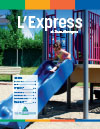Heat, especially when combined with various risk factors, can be demanding on the human body, can lead to significant discomfort and, in the most extreme cases, may also be life-threatening. In summer, heat waves need to be carefully monitored (3 consecutive days when the maximum temperature is equal to or higher than 30°C, without taking the humidex—short for humidity index—into account), as they can get worse. Such weather conditions are called oppressive heat or extreme heat.
Vulnerable people
- young children
- seniors
- people with certain chronic illnesses or mental health problems or those taking certain medication or consuming drugs or alcohol
- people living in an urban heat island without access to air conditioning, those living alone and no longer fully self-sufficient
- low-income earners
- workers and athletic people carrying out demanding physical activities or working in a particularly hot environment
Symptoms to watch for
Quebec Government’s website explains the effects of oppressive and extreme heat on health.
Symptoms to watch for in adults:
- general discomfort
- extreme fatigue
- dizziness, confusion, balance difficulties, erratic behaviour
- nausea, vomiting
- unusual headaches
- difficulty breathing
- chest pains
- swelling of the lower limbs
- muscle cramps
- chills and sudden onset of high fever
- unusual restlessness
- irritability or confusion
- drowsiness, prolonged sleep and difficulty waking up
- headaches
- difficulty breathing
- abnormal skin colour, turning pale or red
- hollow, dark-circled eyes
- dark urine and reduced urination
- vomiting, diarrhea
If one of these symptoms occurs, it may reflect pathology related to the heat and the person must be seen by a doctor immediately.
These symptoms are intended only as a guide and are not a substitute for professional medical advice. If you have any questions about your health condition, call Info-Santé at 811.
What to do?
- Check the weather and air quality
- Drink before getting thirsty but avoid alcoholic beverages, and beverages with high caffeine and sugar content
- Spend at least two hours per day in an air conditioned or cool area
- Take a shower or a cool bath or freshen up by using a cool and humid towel
- Avoid physical activity or intense prolonged sport, or cut down on physical effort
- Set up your home to limit the amount of heat that comes in (install an air conditioner or fan, close blinds and curtains during the day and open them at night, create drafts, etc.)
- Protect yourself from the sun with light and pale colour clothing and a hat
- Never leave a child alone inside a vehicle or a poorly ventilated room
- Check on relatives; specifically ones with reduced autonomy or living alone
Municipal facilities where you can cool off
- Library : 200, Henri-Dunant Street
- Public Pool: Central Park
- Water games: Louis Warren and Olympia parks
If one of these symptoms occurs, it may reflect pathology related to the heat and the person must be seen by a doctor immediately.
These symptoms are intended only as a guide and are not a substitute for professional medical advice. If you have any questions about your health condition, call Info-Santé at 811.
For more informations
Preventing the Effects of Oppressive and Extreme Heat
The Effects of Oppressive and Extreme Heat
Centre de santé et de services sociaux des Laurentides







